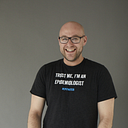Member-only story
Practical Tips For Coronavirus Prevention
What you can do right now to help slow the spread of COVID-19
Despite urgent containment efforts, it has become apparent that SARS-CoV-2, and the disease it causes — COVID-19 — have spread to pretty much every country across the globe. While some countries are reporting small numbers so far, it is almost certain that everyone will, eventually, see an outbreak nearby.
The question on everyone’s lips is the same: “What can I do to protect myself from coronavirus?”.
The unfortunate answer is, not all that much. Despite the vast numbers of people telling you to boost your immune system with everything from vitamin C injections to sex, in all likelihood the only thing that will significantly impact your risk of getting COVID-19 is washing your hands and trying not to touch your face.
What you can do, what everyone can do, however, is help to protect society. This doesn’t mean that you personally won’t catch the disease, although it may reduce your risk somewhat, but what it really means is that fewer people will get sick, and when they do they will be better cared for.
